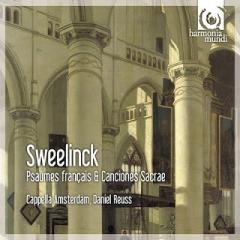Sweelinck - Psaumes Francais and Canciones Sacrae (2009)
Sweelinck - Psaumes Francais and Canciones Sacrae (2009)

1.Psalm 133, "Resveillez vous, chascun fidele" 2.Psalm 91, "Qui en la garde du haut Dieu" 3.Psalm 130, "Du fonds de ma pensee" 4.De profundis clamavi ad te Domine 5.Magnificat anima mea Dominum 6.Beati pauperes spiritu 7.Psalm 77, "A Dieu ma voix j'ay haussee" 8.Psalm 42, "Ainsi qu'on oit le cerf bruire" 9.Psalm 146, "Sus mon ame, qu'on benie le Souverain" 10.Te Deum laudamus David Jansen – organ Ophira Zakaï - lute Cappella Amsterdam Daniel Reuss – conductor
Jan Pieterszoon Sweelinck, "the Orpheus of Amsterdam," was active at the beginning of the 17th century. Along with the English madrigalists he was one of the last exponents of polyphony in the Renaissance style. He was equally celebrated for instrumental and vocal music in his own time, but now it is his keyboard pieces (which were diffused as far as England) and viol music that get played most often, and this fine sampling of his sacred vocal music will be a welcome addition to Renaissance collections. Among the more famous composers of sacred music in the late Renaissance the one he resembles most is Lassus: his style is restrained, not especially chromatic, yet highly expressive, with a seemingly inevitable connection between music and text, and long lines that seem to unfold over vast stretches of music in substantial pieces like the beautiful 15-minute Te Deum laudamus at the end. His general style was mapped onto diverse Protestant (Calvinist) and Catholic styles in the religiously tolerant city, which especially in the Protestant sphere also allowed a strong secular orientation: Calvinist services permitted no music, and churches like the Oude Kerk, then as now, often served as concert halls. The CD booklet (with commentary and texts in English, German, and French) illustrated this delightfully with a portrait of Sweelinck in a church crowded with all kinds of people and activities. The French pieces (apparently in French, not Dutch, because Sweelinck preferred the French texts) are psalms based on preexisting melodies; the Canciones Sacrae are Latin Catholic motets with a soberness and expressive intensity that ought to recommend them to any choir. These are played with an unobtrusive continuo of lute and organ, a decision that ought to be explained inasmuch as the booklet stresses the slow adoption of this Italian innovation in the Netherlands. The performances by the mixed-gender adult, 18-voice Cappella Amsterdam are otherwise ideal, with flawless intonation that nevertheless gives the expressive dimension of the music room to breathe. --- James Manheim, Rovi
download: uploaded yandex 4shared mediafire solidfiles mega zalivalka filecloudio anonfiles oboom
Zmieniony (Czwartek, 12 Czerwiec 2014 16:44)








